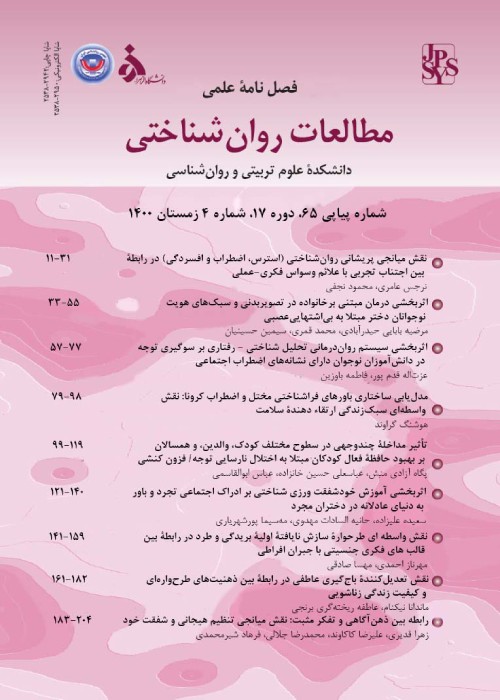The Effects of Cognitive-Behavioral instructive Method on improving Social Cognition among male delinquents
Author(s):
Abstract:
The purpose of this research was to determine the effects of cognitive- behavioral method on social cognition among male delinquents with aggressive crimes. The research method was experimental with pre- test and post- test design and control group. The statistical population was male delinquents living in a correctional center in Tehran in 1386 that committed aggressive crimes. The sample consisted of 48 boys that randomly selected and assigned in experimental and control groups. For data collection subjects completed social problem solving inventory -revised(SPSI-R) of D’Zurrila, Nezu, and Maydeu Olivares, and two questionnaires, anger- control and communication skills, that were designed by the researcher. Three experimental groups were used in this research. The first group received 10 instructional sessions about social problem solving and communication skills, the second group received 8 instructional sessions about anger control, and the third, as integrative group received 18 instructional sessions. Instructional sessions were based on cognitive- behavioral method. For data analysis, test of MANOVA showed that cognitive- behavioral method was effective for improving social cognition (in areas of anger-control and communication skills and constructive and dysfunctional dimensions of social problem solving) among delinquents. Comparisons between groups with ANCOVA indicated that differences of mean in anger-control skills (p<. /01), commnication skills (p<. /01), and dysfunctional social problem solving skills (p<. /05) were significant. Differences between groups in constructive social problem solving skills, however was not significant. Results of follow up test, Bonferrony, indicated that differences of mean between experimental and control groups in all groups in anger-control and communicational skills was significant. In comparisons with the control group, however only in integrative group, dysfunctional social problem solving was improved among male delinquents. In none of the groups differences of mean between experimental and control groups was not significant on constructive social problem solving.
Language:
Persian
Published:
Quarterly Journal of Psychological Studies, Volume:5 Issue: 2, 2009
Page:
45
https://magiran.com/p679796
دانلود و مطالعه متن این مقاله با یکی از روشهای زیر امکان پذیر است:
اشتراک شخصی
با عضویت و پرداخت آنلاین حق اشتراک یکساله به مبلغ 1,390,000ريال میتوانید 70 عنوان مطلب دانلود کنید!
اشتراک سازمانی
به کتابخانه دانشگاه یا محل کار خود پیشنهاد کنید تا اشتراک سازمانی این پایگاه را برای دسترسی نامحدود همه کاربران به متن مطالب تهیه نمایند!
توجه!
- حق عضویت دریافتی صرف حمایت از نشریات عضو و نگهداری، تکمیل و توسعه مگیران میشود.
- پرداخت حق اشتراک و دانلود مقالات اجازه بازنشر آن در سایر رسانههای چاپی و دیجیتال را به کاربر نمیدهد.
In order to view content subscription is required
Personal subscription
Subscribe magiran.com for 70 € euros via PayPal and download 70 articles during a year.
Organization subscription
Please contact us to subscribe your university or library for unlimited access!




